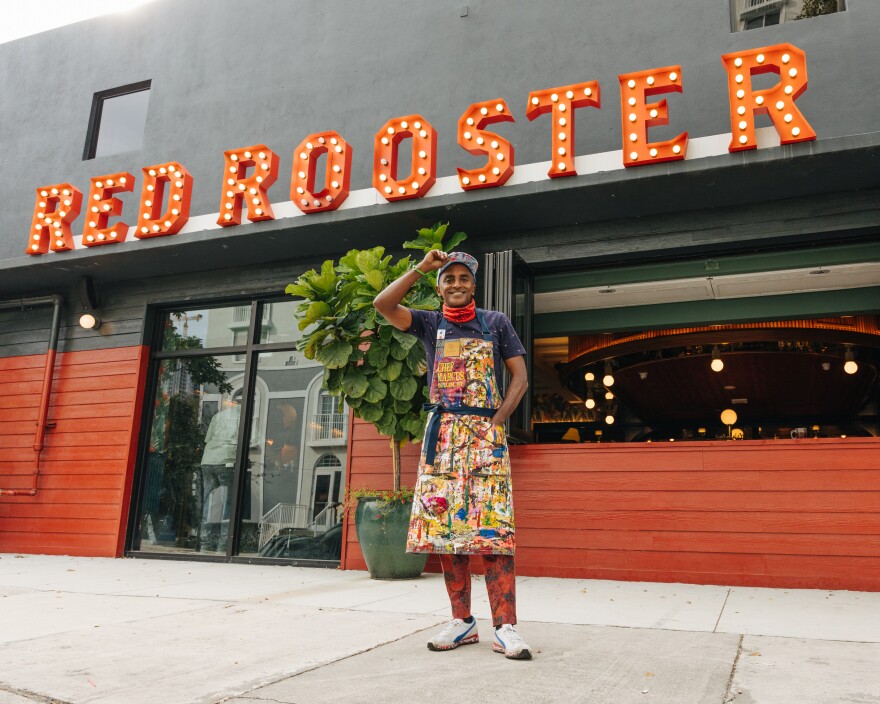The business climate for restaurants was much different when star chef Marcus Samuelsson began the process that would result in opening his first South Florida location.
In 2016 the economy was booming. Unemployment had been falling for years. It was below five percent in Miami-Dade County. Incomes were rising and tourism was red hot.
By the time Red Rooster Overtown finally opened for paying diners on Dec. 3, 2020 the local unemployment rate would be the second highest in the state, tens of thousands of hospitality jobs would disappear, tourism would be on life-support, and countless restaurants would be closed — many for good.
You turn to WLRN for reporting you can trust and stories that move our South Florida community forward. Your support makes it possible. Please donate now. Thank you.
Samuelsson is a celebrity chef with all the credentials – international experience, top reviews, a collection of James Beard Foundation Awards (the Oscars of food), TV cooking contestant, mentor and judge, cookbook author and travel food TV show host. He opened his Red Rooster Harlem restaurant in 2010.
The Marcus Samuelsson Group now has a dozen owned or licensed restaurants in five countries. His Red Rooster Overtown is the newest. It opened after two false starts held up by the pandemic. It comes with the hype that can surround a celebrity chef opening a spot in South Florida, but there are some big differences. It opens amid a deep restaurant recession. The restaurant is not among the hotels and beaches focused on tourists. It’s in the historically Black Overtown neighborhood and it opened during a racial reckoning.
"It was very important for us to open, to not give in to the pandemic," said Samuelsson.
Six years ago the local community redevelopment agency began looking for an operator to open a restaurant and entertainment venue in the Clyde Killens Pool Hall. The strategy was to "attract patronage to this entertainment and cultural district of Overtown throughout the day and into the late evening," according to the request for proposal.
The pool hall is a two-story building on Northwest Second Avenue. It was once the entertainment district of Overtown.
Samuelsson won the bid in early 2016. A year later he bought the property for $1.5 million and the redevelopment agency extended him up to $1 million in grant money to renovate and build-out the space into a restaurant and club. The grant money came with requirements for Samuelsson to hire workers from the surrounding area.
"It means something to be in Overtown with such an important history, particularly for the Black community in Miami," he said.
The total investment was about $5.5 million including the purchase of the property according to Samuelsson. He said about 90 jobs have been created and most of them have been filled by workers from the Overtown, Wynwood and Liberty City neighborhoods.
Before the pandemic, unemployment was much higher in South Florida Black neighborhoods than for the overall community. In 2018, Overtown’s jobless rate was 24% according to data from Miami-Dade County.
While unemployment has fallen across the board since the worst of the pandemic-induced job cuts in March and April, it has dropped more slowly for Black people.
"If you go back to the core word, what a restaurant means, it means to restore your community. Our goal is to create a lot of jobs, but also bring back that hospitality in Overtown to thrive again," he said.
The chef called 2020 "the hardest year we've ever gone through" for the restaurant industry. Restaurants were closed for two months to indoor diners in Miami. While seated diners have been returning as restaurants have reopened with restrictions, in-person dining was down about 15 percent in the last week of January in Miami — according to data from OpenTable.
"The two blessings of being both Black, but also an immigrant is that you're constantly pushed, you constantly have to figure out a new situation. And you have to make the best out of it," Samuelsson said.
Less than a mile from where he opened Red Rooster Overtown, and 61 years ago, Black people could not get served a sandwich at the same lunch counters as white people. Segregated lunch counters in stores like Grant’s Department Store and Jackson’s-Byron’s in downtown Miami were the scene of sit-ins in 1959.
Restaurants and race are part of the history of segregation and racism — a history communities are struggling to reckon with — particularly since the killing of George Floyd by a Minneapolis police officer in May.

Connecting restaurants and race was not a direct aim for Samuelsson when he began his culinary career. He was born in Ethiopia, raised by his adoptive parents in Sweden and studied in France before coming to New York. But his social aims have become part of his business plan and, as much as he is known for his flavors, he has become a voice for Black chefs and restaurant workers.
His new book is “The Rise – Black Cooks and the Soul of American Food.” It was published about six weeks before he opened his newest restaurant in Overtown.
"We have to have access to traditional bank loans, to traditional lending strategies because the generational wealth in our community is just not there," he said. "That traditional lending system has to come back for entrepreneurs, for food entrepreneurs."
Samuelsson knows he's in a unique position thanks to his success and media profile. He said he didn't have a choice of investors 20 years ago, but he does now.
"I interview [investors] because if they're not interested in the social justice piece, we're not a good match. That doesn't make them a bad person," Samuelsson said, calling that choice a "privilege."
"I have to acknowledge that, but that's also what I've worked toward," he said.



